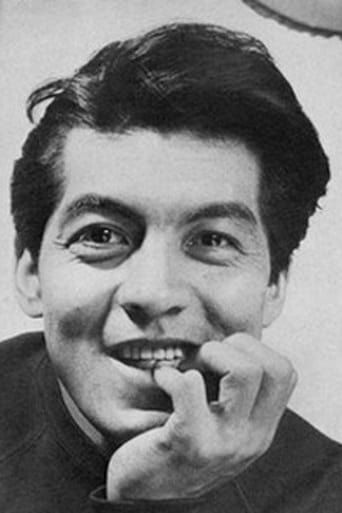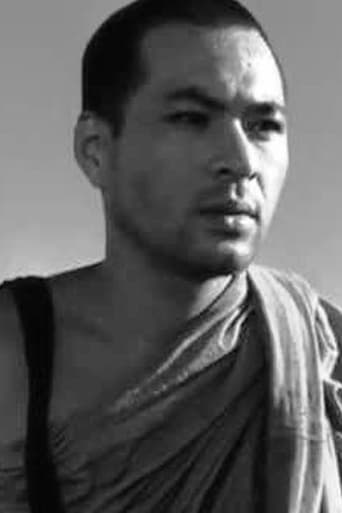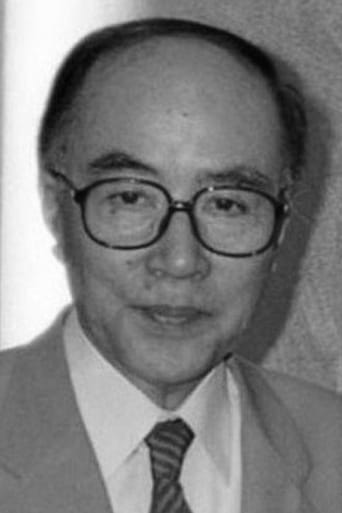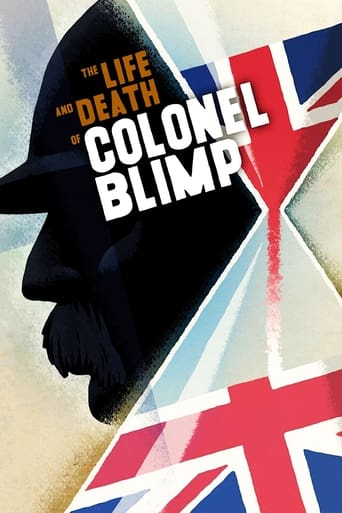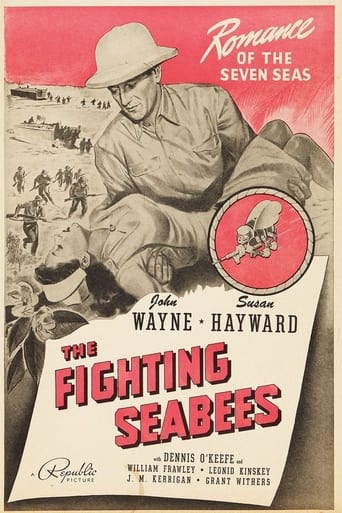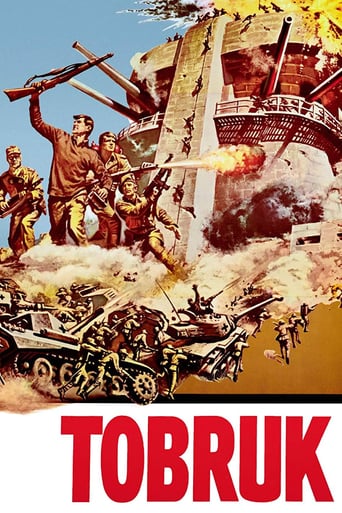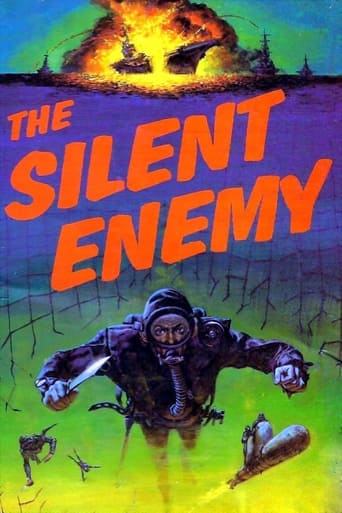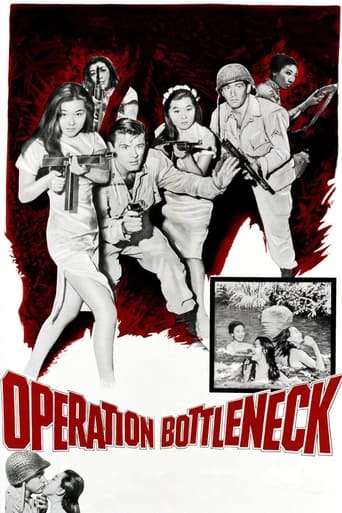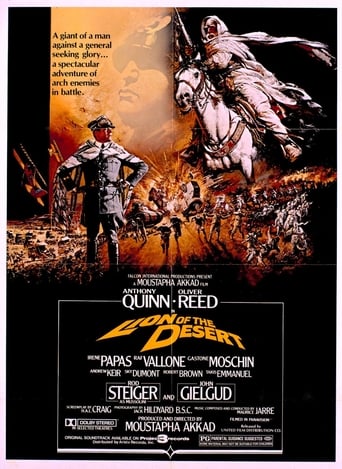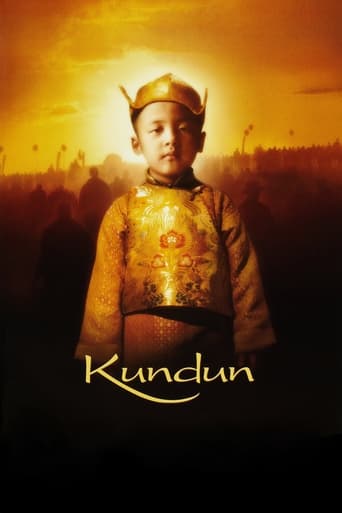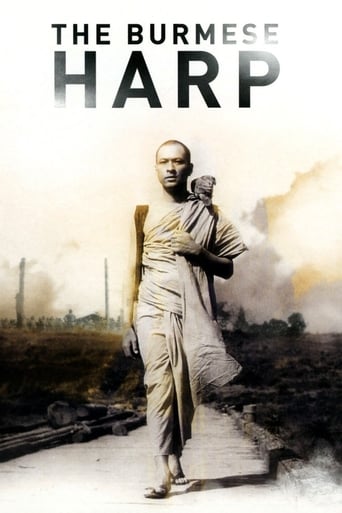
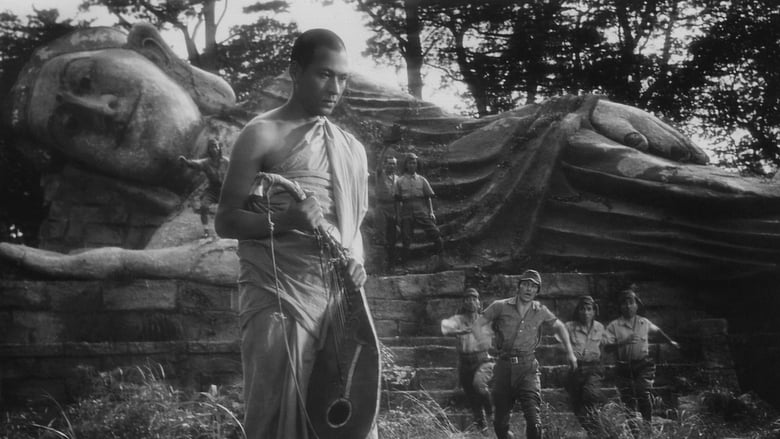
The Burmese Harp (1956)
In Burma during the closing days of WWII, a Japanese soldier separated from his unit disguises himself as a Buddhist monk to escape imprisonment as a POW.
Watch Trailer
Cast


Similar titles
Reviews
A well-known Japanese director Kon Ichikawa, in his masterpiece "The Burmese Harp", reveals how small groups of Japanese soldiers reacted to the end of the World War II. The off-screen voice, which belongs to one of these soldiers, narrates how he alongside his comrades had to face difficulties not only on the battlefield, but also after the War had come to an end. Hoping to return to Japan and "rebuild" it, his group surrenders to the British, while the other one refuses to do so. All of the attempts to persuade this second group were in vain for the soldier Mizushima, the main hero of the movie, who could skilfully play the harp and accompanied the songs of his fellowmen. In half an hour, British bombarded the non-surrendering Japanese troops, whereas Mizushima managed to survive. Although he seemed to have got lost and the evidence pointed to his death, his comrades didn't abandon the attempts to find him. When they finally managed to do so, they discovered that while feeling guilt for his failure to prevent the death of the soldiers, Mizushima becomes a monk and decides not to return to Japan unless the bodies of his countrymen are scattered in Burma. This movie should be viewed as more than simply a narrative about the desperate monk and the soldiers, who had to cope with the consequences of the World War II. Each character and each scene symbolizes the Japanese view on their nation during this significant historical event. For instance, the group of Mizushima is portrayed as it had to surrender, but nonetheless had a great goal to come back to Japan and "rebuild" the motherland. The group of soldiers expressed its patriotism even more explicitly, by refusing to give up and preferring death for the sake of Japan. Such elements of the movie are particularly important in a way that each of the two groups of soldiers seems to represent the Japanese spirit and a strong sense of the national identity.A harp being another central element of this film seems to serve several functions. It is an instrument, which during the most difficult moments of war acted as a therapy, raising the spirits of the fighters. Moreover, it is a tool and language of communication, which sends different signals to the soldiers and is difficult to understand by the outsiders. It is also a distinctive feature of Mizushima, by which his comrades managed to distinguish him while being in search. And the way in which it is depicted in the movie makes it not a less significant hero than Mizushima.The role of Buddhism in this movie, however is more implicit. One might get an impression that a few references of the words "Buddha" and "sutra" makes the Buddhist context less significant, while the temples and statues, shown in the movie have a decorative function. Yet, such conclusions might be misleading. Although they contain partial truth, and even Mizushima as a monk, has little to do with the commonly accepted characteristics of monks, other than his appearance, the most important message of the movie still coincides with the Buddhist understanding of the world. In one of the final scenes, when the Captain is reading the letter of Mizushima, the Buddhist observer can easily identify the First Noble Truth that "life is suffering". This truth concerns not only the life of Mizushima, but all of the people who witnessed the war. It is definitely true that Mizushima's decision to remain in Burma was motivated by the self-imposed duty to bury his dead countrymen in an appropriate way, which in its turn is a deal of honour. Yet, it is also probable that the internalization of the Buddhist ideas influenced his decision to adhere to the monastic way of life. For these reasons, it would be incorrect to undervalue the role of Buddhism in this movie.Mizushima, being the central character of the movie, is worth being noted separately. He is the embodiment of the true Japanese soldier, an impression that comes to mind first while watching the movie. This is a complex character, who experiences an internal struggle and dilemma regarding his comrades. Although it seemed rational to come back home, his devotion to his fellowmen and his honour prevented him from returning to Japan. His even more serious decision to devote his life to the Dharma, Buddha and the Sangha make his heroic image even more appealing. In general, the fact that it was the mid-20th century product does not make its quality less worth-praising. Most probably, this is due to the realistic delivery of the atmosphere of the War period and the actors, most of whom, had undergone these times themselves. The efforts put by the movie crew seem to have been justified, due to the worldwide recognition and mainly a positive reception of the film. After all, this is an exceptional drama, with a breath-taking plot and full of different ideas that give a spectator some "food for thought".
"The Burmese Harp" meditates brilliantly on comradeship, killing, surcease from killing, guilt, remorse and reverence for the dead. From early in his career, this supple and nuanced story discloses Ichikawa to have a subtle mind that operated on many levels. Ichikawa's outsize talent would soon be declared in full force by "Fires on the Plain." This film broods on horror that one man tries to stop, and cannot, and spends the rest of his life in penance for. The story arc celebrates Buddhist thinking, and has such universal themes of guilt, commitment, personal accountability, isolation and shame that it could be transposed well to another place and time. Ichikawa's film occasionally tear-jerks, and some of the musical digressions could be trimmed, but "The Burmese Harp" is anchored by a deft human touch and a pervasive sense of ethnicity-transcending universality. Minoru Yokoyama, the cinematographer, has lovingly lensed this film with an attitude of creating iconography, which he has. Shoji Yasui's performance as Mizushima is one in which muses ever sing.
Based on a novel by Michio Takeyama of the same title, Biruma no Tategoto is a beautifully produced movie about the last days of war in Burma. Mizushima is a foot solder in his platoon fighting the Pacific War in Burma against the British and the allied forces. He's with a commander who used to be a musician, and he himself had exceptional music talent as he picked up a Burmese harp and learned to play all by himself. His platoon learns of the ending of the war and Japan's surrender. They surrender to a near by British camp, but about a hundred miles away, he hears that the war is still on going by a troop that hasn't heard the news. Mizushima volunteers to be the messenger to deliver the message to the troop, but the soldiers there are determined to die for the country and refuses to surrender. Mizushima gets injured in the incident, and is brought back to health by a local monk. He then puts on monk's robe as disguise to travel the country undetected. But as he travels, he witnesses the carnage the war has left. This transforms him from a person in guise of a monk to a true monk that feels his mission is to devote himself to the ones who died in the war. The movie is a war movie of a different sort. It's an accurate account of the war mixed with fantastic novel about the people, the circumstances, and the coincidences that connects the story together. Through the transformation of Mizushima, we are shown the tragedy of war, and its senselessness. Never a word against war is spoken in this story, as the characters are all proud men of the Japanese army, but it conveys the message that war is wrong in the sincerest way.I didn't know that this movie was directed by Kon Ichikawa. This must be one of his early great works. It's a beautiful story like no other, and is sure to leave lasting impression on all who sees it.
Last Thursday night I was sitting in a tiny Amtrak station in Bloomington, Illinois waiting for my train to take me to my beautiful girlfriend in Chicago. As I sitting there, I was joined by a group of stereotypical sorority girls from Illinois State University. For almost an hour I was subjected to their countless stories about meaningless sex, Lady Gaga and the "pounding of shots" that they were so excited to soon be doing in the windy city. By the time we boarded the train, I had realized that I was alone in the car with these five exhausting females. I scurried to the far back to make sure that I could secure a seat by myself and far away from these strangers.My efforts were in vain because one of them spotted my fraternity letters and found it necessary to try and sit next to me. "You're a frat boy, you may enjoy some of my stories". I could not think of any other way to make her leave me alone, so I whipped out my laptop and started watching my next film from the 1077. "What 'cha watchin'" she asked. I answered - "a black and white Japanese anti-war movie made in 1956". After hearing this, it did not take her long to jump out of her seat and rejoin her group of woo-girls. The Burmese Harp saved the day.Little did I know that this movie would not only save me from two hours of annoyance, but it would also be an extremely rewarding viewing experience. Though I was watching it on my laptop, I was still in awe of the Criterion DVD quality and the flawlessness of the hushed black and white. The cinematography is simple and the landscaping of Burma is vast and magnificent looking. It was easy to see that the filmmaker was not interesting in a mass amount of dialogue. It was the striking subtlety in the visual style that properly denoted the overall theme of the movie.The Burmese Harp is about a Japanese soldier stationed in Burma during the days immediately following the end of World War II. He has developed a love for playing the harp and uses it to signal danger to his troop. His playing is also used as a way to raise moral in the lonely mountains of Burma. Music, whether instrumental or vocal, plays a major role in the film. In fact, it seemed like the majority of the communication was presented through song. The sound of the harp is soothing and easy on the ears. It is a beautiful instrument that compliments the smooth visuals.The story is also vividly entertaining in is simplicity. After retreating to the British, the soldier - Mizushima - is sent to try and convince another Japanese troop to surrender. He fails in doing this and the entire troop is eventually killed by British forces. This leads to Mizushima, and his harp, being separated from his fellow soldiers and he is now left to roam the countryside of Burma. As we walks, he meets a spiritual leader and realizes the devastatingly high amount of Japanese casualties caused by the violence of World War II. He sees the bodies of thousands of soldiers with his own eyes. He is traumatized and dedicates his life to giving them a proper burial.The Burmese Harp is the first film by Kon Ichikawa to be seen outside of Japan. It is also one of the first Japanese movies to receive critical acclaim in the United States. What really makes it stand out is that it was the first example of an anti-World War II statement being made by the Japanese through cinema. We forget that everybody is hurt by war, and that the lines are not always as clear as good versus evil. The men in the Japanese army had families, kids and dreams of their own. They just wanted to return home - though they would find that home hardly existed as they knew it before the war.Yes, I may be in debt to The Burmese Harp for saving me from the incoherent ramblings of a loud and proud party animal, but I also legitimately enjoyed it on almost every level. This is a great movie and could serve as an outstanding introduction into Japanese, Asian or world cinema. I am a big fan. I immediately bought the Criterion DVD. You should borrow it sometime...


